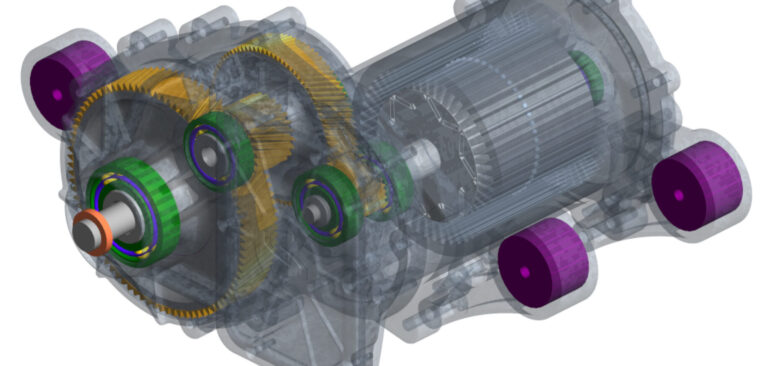David Kelly, director, Drive System Design (DSD), explains how, when applied correctly, simulation or virtual testing can enhance and accelerate the hardware testing process.
The speed at which the automotive sector is evolving has put further pressure on vehicle manufacturers to reduce their time to market for new products, cut the cost of prototypes and testing, and identify development risks in relatively immature electrified systems. As this has coincided with the greater availability, accessibility and accuracy of simulation tools, a growing trend is emerging in which early stage hardware testing is being replaced by sophisticated virtual models.
Used appropriately, simulation can make subsequent physical testing much more effective in several ways. Increased understanding of the design space early in the process permits faster convergence on a mature level of design, which means the testing downstream can be more focused, more efficient and more effective. As a recent example, we used complex CFD virtual verification to identify risks in the thermal performance of an electrified ‘A+’ sample system that allowed for a highly focused risk-based test phase that led to rapid definition of the vehicle test fleet prototype specifications.
The demand for high-quality data to support virtual modeling can also lead to improved communication between teams of specialists. The complex relationships in a hybrid/electric vehicle, for example, bring together thermal, mechanical, electromagnetic, software and other domains. Unlike a traditional approach in which each team contributes its hardware for testing, simulation demands a much more detailed and integrated level of information, earlier in the program, in order to facilitate building of the mathematical system models. This typically leads to greater exchange of critical data about the interfaces between the various system elements, and their individual characteristics.
While advances in modeling tools are allowing increasingly accurate simulations to be executed, this represents only half the story. As vehicles have become more complex, selecting the individual elements of a powertrain and arranging the architecture optimally has become increasingly challenging. Unlike traditional powertrain alternatives that were well understood and highly mature, today’s options are evolving rapidly, with even the core technology of elements such as motors and batteries subject to change. Managing the matrix of potential solutions and clearly identifying trends and trade-offs has become a significant challenge in itself. Before any detailed analysis is carried out, a reliable means to establish the optimum concept is required.
At DSD, we apply a systems engineering approach in order to establish the effects and requirements of the individual sub-systems on the overall system. This ensures that the requirements of the complete system are fully understood and protected during any trade-offs between individual elements. In the case of DSD, a tool developed in-house, EPOP (Electrified Powertrain Optimisation Process), evaluates the complex array of powertrain considerations such as cost, mass, performance, NVH, thermal and energy consumption and range, to derive the best candidates for either an application-specific or ‘product-family’ architecture and component specification. Only when the preferred architecture is identified does the more complex and detailed analysis take place.
Control software is another area that is increasingly important and a differentiating factor in modern electrified powertrains. When it comes to software, simulation is a critical step to achieve high functional maturity ahead of hardware-based testing, significantly reducing the time to develop, verify, validate and deploy a function. At DSD, our HIL (hardware-in-the-loop) testing facility integrates vehicle simulation over real-life scenarios and use cases, network simulation (CAN/Lin/Flexray), electrical fault injection, sensor and actuator electrical signatures and in-house-developed custom powertrain models with accurate representation of electrified system dynamics. Once the hardware is available on the test rig, the same driving scenarios, use cases and vehicle behavior can be linked to a dynamic rig replacing the simulation model of the electrified system. The latest, called ‘rig-in-the-loop’, allows the replication of realistic dynamic driving scenarios allowing an extensive validation of the software and hardware transients.
Ultimately, physical testing will always provide the final validation but the urgency of the market shift to electrified powertrains has intensified the need to develop new solutions more quickly. Simulation can provide the understanding necessary to deliver a ‘bigger bang for the buck’ from every hour of physical testing, meaning either shorter timescales or more comprehensive validation within a given timeframe. Continuous adjustment of these simulation models with the physical testing results then creates a ‘virtuous circle’ of improved quality of virtual verification within the immediate product cycle (so called ‘digital twin’) and enhanced processes to be applied to the next generation of systems, where expectations for performance will be greater still.


